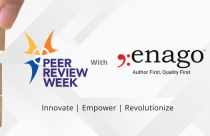Importance of Peer Review in Maintaining Research Integrity

Less talked about, more frowned upon – A Peer Reviewer!
“Remember that paper I submitted to that reputed XYZ Journal?” said a researcher 1 to his fellow researcher 2. “Well, it is a one-year anniversary to that submission day!”
“Did you not hear from them?” asked researcher 2, “From the editor or the editorial assistant of the journal?”
“Yes, they have a portal which shows the manuscript is yet to be assigned to a peer reviewer,” said researcher 1. “I sometimes wonder; how difficult is it to find a reviewer? I mean a year to assign a reviewer!”
Disappointment, dejection, and anger towards research publishing system is not new in today’s era of scientific research, wherein researchers constantly juggle between Publish or Perish. Bearing the brunt of these dejected researchers are peer reviewers, who, for a fact, are known less but criticized the most. Indeed, it is agreeable that researchers take maximum responsibility of their project, but a research study is improved extensively through a reviewer’s perception.
Believe it or not, peer review is embedded in the core of our knowledge generation systems, viewed as a method for establishing quality research. Despite its critical importance, it remains poorly understood and often blamed upon for research biases.
In this post, we focus on few of the gaps in understanding peer review process and emphasize the function and quality of reviewing to give a deeper meaning to the social impact of peer review.
Peer Review — Upholds the Integrity
Peer review has a commitment to uphold integrity of the published scholarly record. It is a ubiquitous for scholarly research quality assurance and assessment. It plays a critical role in research and development. As we are aware, it plays a central role in defining the structure of research publishing. Furthermore, publication of peer-reviewed journal articles is essential in research careers, conferring academic prestige and scholarly legitimacy upon research and individuals.
However, peer review process is routinely criticized and discussions on various forums and social media platforms state how peer review is not particularly well-developed, often produces conflicting, overlapping or inconclusive results depending on scale and scope. Moreover, suffers from similar biases as related to the scholarly literature. The real danger here is in the lack of understanding of the ideology and practice of peer review.
Ill-informed generalizations and stress between the viewpoints makes peer review process a gold standard with very little scope for reform. However, despite the viewpoints, it is an incredibly diverse and multi-modal process.
Role of Reviewers in Peer Review
The reviewers are experts in the field, with no direct affiliation with the authors. These experts read and assess the manuscript, providing feedback that the editor sends to the authors.
A Reviewer:
- Ensures the standards of scientific process are met by being a part of the peer review process.
- Maintains the quality of the journal by identifying invalid research.
- Fulfills responsibility to the community and their expertise in research.
- Prevents unethical practices by identifying plagiarism and research fraud.
The reviewing process is not only difficult for researchers who have to go through rounds of editing and answering reviewers’ comments, but taxing for the reviewers as well. In fact, most of the times, reviewers are not paid for their time spent reviewing manuscripts, and are fellow academics who are expected to take time away from their regular job to be a reviewer.
Furthermore, academics are expected to dedicate their time to altruistically review the manuscripts, with non-monetary rewards like obtaining free journal access, being acknowledged in journals for their efforts, the possibility of receiving favor from journals when they need to publish papers, etc.
Potential Issues of Peer Review Process
High Number of Paper Submissions
The journals are overwhelmed in search of more peer reviewers as there are high number of papers submitted for review every day. This creates a pressure on the existing peer reviewers and makes peer review process an overwhelming journey for the reviewers. Especially, the decision of reviewers can be inconsistent.
Lack of Clarity in Role of a Reviewer
Often, there is a lack of distinction between the role of a reviewer, whether they are a judge, juror or an independent assessor. The assessment of manuscripts requires a holistic view, which requires attention to a variety of factors, including stylistic aspects or finding novelties, which makes the task and depth of reviewing extremely challenging.
Lack of Rewards/Incentives for Reviewers
There is lack of rewards/incentives that could motivate reviewers to embark in rigorous testing or replications of the study. Furthermore, reviewers are expected to perform an inconsistent variety of multiple tasks which include providing recommendations, addressing ethical concerns, assessing the content of the manuscript and making general comments about submitted manuscripts.
Issues with Open Peer Review
One of the most critical issues regarding ‘open peer review’ is whether or not blinding should be preferred. It is commonly seen that revealing reviewer identities could be detrimental to early career researchers and may also offend senior researchers.
Maintaining Research Integrity
Peer reviewing is a bidirectional process, and the authors, editors, and reviewers all stand to gain from it as a learning experience and for developing new ideas. Therefore, it is important to gain deeper understanding of peer review as a primary form of research evaluation. The journey could begin from fostering trust in the peer review process and gaining transparency in review processes to deal with the potential issued listed above.
As discussed by the Scholarly Kitchen, research integrity encompasses conducting, reviewing and disseminating research in a transparent, rigorous, and ethical manner. The Peer Review Week 2022 chose “Research Integrity: Creating and supporting trust in research” as its theme for the year to raise queries that desperately needs research community’s attention.
Maintaining research integrity needs creating a symbiotic relationship between peer reviewer and authors, editorial assistants, editors, and research funders, publishers, and organizations. Not only ensuring all reviews are ethical and unbiased, but also making sure that a reviewer’s work is recognized helps nurture trust in the process, and encourages peer reviewers to do what is best for research.
And although the wait after manuscript submission is daunting, there really are too many papers to be reviewed and too less reviewers at service!









